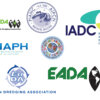Financial Institutes and Lending Agencies for the support of emerging nations are organised on a regional basis under the auspices of the World Bank.
Compliance with the London Convention of 1972 and other pertinent international agreements are mandatory for those projects that wish to be financed by international lending organisations such as the World Bank and the Regional and Sub-Regional Banks.
Global Lending Agencies
Dredging projects in emerging nations are often dependent on the availability of funds from third parties in the form of lending agencies. A number of possibilities exist, including global, regional, and national lending agencies. Financial support from these agencies is often dependent on adherence to the international and regional conventions that govern the placement of dredged materials at sea. The largest and most widely active of the lending agencies is the World Bank, sometimes referred to as the World Bank Group. It consists of a number of affiliates, namely:
- International Bank for Reconstruction and Development (IBRD)
- International Development Association (IDA)
- International Finance Corporation (IFC)
- Multilateral Investment Guarantee Agency (MIGA)
- International Centre for Settlement of Investment Disputes (ICSID).
The common objective of these institutions is to help raise the standard of living in developing countries by channelling financial resources from developed countries to the developing world.
International Bank for Reconstruction and Development
IBRD is owned by the governments of 185 countries and makes loans towards developing countries at more advanced stages of economic and social growth. Loans generally have a grace period of five years and are repayable over fifteen years or less and must be guaranteed by the government concerned. The interest rate is calculated in accordance with a guideline related to its cost of borrowing. The Bank’s decision to lend must be based on economic considerations alone, with due regard to the prospects of repayment. Typically, concerning port and waterway development, the loan would be made to the port authority, the port itself or to some parastatal agency responsible for waterways.
International Development Association
IDA has the same objectives as the IBRD but provides assistance concentrated on the very poorest developing countries, and provides terms that would bear less heavily on their balance of payments. About 80 countries are currently eligible. The terms of IDA credits, which are international, regional, and national agencies made only to governments, are ten year grace periods, thirty-five or forty years maturity and no interest. For port and waterway development, the loan would probably be on-lent to the port authority, port or waterway agency at interest rates which reflect the cost of borrowing and with a maturity based on the agency’s financial capabilities.
International Finance Corporation
IFC assists the economic development of developing countries by promoting growth in their private sector economy and by helping to mobilise domestic and foreign capital for this purpose. IFC has, for instance, through equity contribution and other means promoted the development of a number of marine terminals and port facilities mainly associated with industrial activities. Some of these projects have included major dredging works.
Multilateral Investment Guarantee Agency
MIGA was established to encourage equity investment and other direct investment to developing countries. MIGA offers investors guarantees against non-commercial risks; advises governments on policy and programmes to encourage foreign investments; and sponsors a dialogue between the international business community and host governments on investment issues. It is worth noting that commercial banks and other private financial bodies have become quite interested in port facilities and operations as potential areas for investment. Worldwide most ports are profitable and are also foreign exchange earners and thus are attractive to commercial investors.
International Centre for Settlement of Investment Disputes
ICSID is the world’s leading institution devoted to international investment dispute settlement. Nation-States have agreed on ICSID as a forum for investor-State dispute settlement in most international investment treaties and in numerous investment laws and contracts. It was established in 1966 by the Convention on the Settlement of Investment Disputes between States and Nationals of Other States and is a multilateral treaty formulated by the Executive Directors of the World Bank to further the Bank’s objective of promoting international investment. ICSID is an independent, depoliticized and effective dispute-settlement institution.
Regional Lending Agencies Paralleling the World Bank
A number of regional development agencies have been instituted to serve specific areas of the world. These are:
- European Bank for Reconstruction and Development
- African Development Bank
- Inter-American Development Bank
- Asian Development Bank.
In addition, there are other multilateral financial institutions (MFIs), such as:
- European Commission (EC) and European Investment Bank (EIB)
- International Fund for Agricultural Development (IFAD)
- Islamic Development Bank (IDB)
- Nordic Development Fund (NDF) and Nordic Investment Bank (NIB)
- OPEC Fund for International Development (OPEC Fund).
And sub-regional banks, such as:
- Corporacion Andina de Fomento (CAF)
- Caribbean Development Bank (CDB)
- Central American Bank for Economic Integration (CABEI)
- East African Development Bank (EADB)
- West African Development Bank (BOAD).
These banks provide funds for development in their regions in much the same manner as the World Bank.
National Lending/Development Agencies
On a smaller scale, most of the industrialised nations have set up government departments to handle the provision of bilateral aid to a number of targeted countries or regions. The focus of this development assistance is normally affected by historical relationships or current trading patterns. For instance, the British, Dutch and French aid programmes often, but not exclusively, aimed at those countries which were once their colonies. This bias has now shifted to reflect the changing trading arrangements and socio-political aspects of the modern world. In cases of emergencies, such as flooding in Bangladesh, or the tsunami in Southeast Asia, many nations cooperated to bring aid to the hard-hit regions.
It should be noted that country-specific regulations and permitting procedures are updated and change frequently. Therefore, entities considering dredging and marine construction projects are well advised to consult the national, regional and local authorities to ensure that they meet all requirements before embarking on the project.
Export Credits Agencies
Export Credits Agencies, known generally as ECAs, are public agencies that provide government-backed loans, guarantees, credits and insurance to private corporations from their home country for investment abroad in emerging economies. These developing countries may be considered high risk for conventional financing and thus may not qualify for conventional commercial investments. ECAs do not need to have a return on the investment but need only cover operating and financing costs. Over 30 industrialised nations have one or more ECAs. The Organisation for Economic Co-operation and Development (OECD) maintains a list of all ECAs per country.
The European Neighbourhood Instrument
In 1991 the EC launched the “Technical Aid to the Commonwealth of Independent States” (TACIS) Programme to provide grant-financed technical assistance to 12 countries of Eastern Europe and Central Asia (Armenia, Azerbaijan, Belarus, Georgia, Kazakhstan, Kyrgyzstan, Moldova, Russia, Tajikistan, Turkmenistan, Ukraine and Uzbekistan). TACIS is now subsumed in the EuropeAid programme.
From the 2007-2013 EU Financial Perspective, the TACIS Programme was replaced for the countries of the European Neighbourhood Policy and Russia by the European Neighbourhood and Partnership Instrument. In 2014 European Neighbourhood Instrument (ENI) came into force and will remain through 2020. It is the financial arm of the European Neighbourhood Policy, the EU’s foreign policy towards its neighbours to the East and to the South. The 16 ENI partner countries are: Algeria, Egypt, Israel, Jordan, Lebanon, Libya, Morocco, Palestine, Syria, and Tunisia in the South, and Armenia, Azerbaijan, Belarus, Georgia, Moldova, Ukraine in the East.
A separate Partnership agreement is in force with Russia.

















